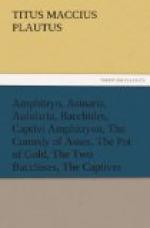Pro di immortales, is quidem huius est pater Philocrati.
God bless my soul!
Why, he is the father of Philocrates
here!
Stal.
Quin melius novi quam tu et vidi saepius.
Well, I know him better than you, and I’ve seen him oftener.
Hegio
Serva, Iuppiter supreme, et me et meum
gnatum mihi.
Philocrates, per tuom te genium obsecro,
exi, te volo.
God Almighty,
save me and save my boy for me! (running to
door and shouting)
Philocrates! Here, here, come, on your
life! I want
you!
V. 3.
Scene 3.
ENTER Philocrates.
Philocr
Hegio, assum. si quid me vis, impera.
Here I am, Hegio. If I can be of any service, command me.
Hegio
Hic gnatum meum
tuo patri ait se vendidisse sex minis
in Alide.
(beside himself)
This fellow says my son—he sold him to
your father—for
twenty-four pounds—in Elis!
Philocr.
Quam diu id factum est?
How long ago was this?
Stal.
His annus incipit vicensimus. 980
Going on for twenty years.
Philocr.
Falsa memorat.
He’s lying.
Stal.
Aut ego aut tu. nam tibi quadrimulum
tuos pater peculiarem parvolo puero dedit.
(indifferent)
One of us is. As a matter of fact, your
father gave you
a little four year old boy for your own,
when you were
nothing but a youngster yourself.
Philocr.
Quid erat ei nomen? si vera dicis, memoradum mihi.
(interested) What
was his name? If your story is true, come,
tell me that.
Stal.
Paegnium vocitatust, post vos indidistis Tyndaro.
Styled Pettie,
he was: later on you folks called him
Tyndarus.
Philocr.
Cur ego te non novi?
How is it I don’t know you?
Stal.
Quia mos est oblivisci hominibus
neque novisse cuius nihili sit faciunda
gratia.
Because it’s
the regular thing to forget a fellow and cut
him, in case his
good will can’t help you at all.
Philocr.
Dic mihi, isne istic fuit, quem vendidisti
meo patri,
qui mihi peculiaris datus est?
Tell me, was that
boy you sold my father the same one that
was given me for
my own?
Stal.
Huius filius.
(with a nod in Hegio’s direction) His son.
Hegio




